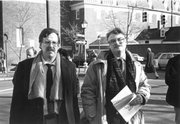

By CHIP BERLET
The Guardian, August 2, 1989
Lyndon LaRouche and his bizarre political movement have always appeared both funny and frightening, and the threads of this seeming dichotomy weave in and out of Dennis King's Lyndon LaRouche and the New American Fascism.
In chapter after chapter of chatty detail, King regales the reader with anecdotes detailing immoral and illegal activity by the LaRouche network. King criticizes both the people who actively collaborated with the madman's minions to obtain a personal or political advantage, and the people who choose to look the other way. For instance:
- Teamster boss Jackie Presser used the LaRouchians to smash union dissidents.
- New York Mayor Edward Koch allowed LaRouchians to smear and red-bait his 1981 opponent, Frank Barbaro.
- The FBI spied on the LaRouchians at the same time it was accepting intelligence from them concerning progressive groups such as the Institute for Policy Studies.
- Staff from Reagan's National Security Council, Drug Enforcement Administration and Federal Emergency Management Agency combed through the voluminous LaRouchian intelligence screeds for the occasional morsel.
Since I also had written about LaRouche for 10 years I knew I would enjoy King's comprehensive review of LaRouche's career; but what is surprising is that I also learned of many escapades and intrigues with which I had been unfamiliar.
Political Coverage Lacking
King goes beyond just reporting to probe into the psychological, cultural and political dimensions of the totalitarian LaRouche cult, and shows how LaRouche moved from socialism to fascism, leading a band of followers down a path of self debasement and delusion.
King also examines why LaRouche has been spared the type of scrutiny and condemnation directed at other hatemongers. After I read the book it was obvious that what was missing all along was not a lack of clarity regarding LaRouche's political ideology, but a lack of political courage and the leadership to combat his ideas. King describes this as a failure of the U.S.'s political immune system. Perhaps, says King, fear of the predictably nasty LaRouchian response of verbal and written assaults and lawsuits protected LaRouche from prosecution for so long.
Indifference or unwillingness to oppose LaRouche-spawned operations lent him legitimacy in the eyes of many voters. These people saw LaRouche as at least willing to address issues that Republicans and Democrats frequently sidestepped with meaningless platitudes. During the late 1970s and early 1980s LaRouche built a following among some unemployed steelworkers, financially endangered farmers, Black urban communities fighting crime and drugs and suburban conservatives troubled by world events. King notes that the mainstream media kept deriding LaRouche for his failure to win elections while ignoring the millions of voters who cast ballots for LaRouchian candidates.
King also notes the double standard that was often applied to LaRouche: "When the Klan endorsed President Reagan," he says, "it immediately received a blistering denunciation from him. But when NBC exposed the administration's ties to LaRouche (while also pointing out LaRouche's ties to the Klan), the White House response was that it would continue to meet with whomever it pleased. Not a single Jewish or Black organization condemned this response, nor did the media take issue with Reagan. Yet the connection between Jesse Jackson and [Muslim Minister Louis] Farrakhan meanwhile became front-page news."
King is critical of those who knew what LaRouche represented, yet smugly decided that the average person needed only to reject LaRouche, not understand him. This view assumed that LaRouche was so far outside the mainstream that his ideas were irrelevant. A few copies of cautiously worded reports were circulated to key opinion-makers, and that became the de facto strategy for dealing with LaRouche, rather than public education and organized resistance. This short-sighted and elitist theory was championed by the leadership of the Anti-Defamation League of B’nai B'rith, but was also adopted by most mainstream human relations organizations.
The attitude of "don't give extremists any publicity" may, sound great at the annual human relations cocktail party, but it simply does not work in communities that are facing a concerted organizing effort or experiencing assaults and violence. It certainly failed to alert many elderly persons to the rapacious fundraising cons of the LaRouchian phone bank and airport pitch artists. The use of the label "extremist" also serves to reinforce the status quo while delegitimizing all dissident viewpoints, whether progressive or reactionary.
In recent years a coalition of groups concerned with prejudice and bigotry, led primarily by the Atlanta-based Center for Democratic Renewal and the American Jewish Committee, have challenged LaRouche-spawned activities with press conferences, leaflets and public seminars. This long-overdue strategy was much welcomed by victims of LaRouchian smears and political campaigns.
A number of left researchers have covertly drawn on the LaRouchian intelligence apparatus, including Village Voice journalist James Ridgeway, author Peter Dale Scott and Christic Institute investigators, to name but a few.
Some critics believe that, at the very least, LaRouchian-supplied information should be identified as such. Others, such as Israeli Foreign Affairs editor and author Jane Hunter, feel that accepting information from fascists and neo-Nazis is unacceptable. This is a debate the left has yet to honestly carry out.
King warns against relying on law enforcement to "do what political leaders are unable or unwilling to do" to stop forces like LaRouche. King concludes that "one thing seems certain: America is too violent and diverse--and too vulnerable to economic crisis--to avoid forever a major internal challenge from some form of totalitarian demagoguery."
Lyndon LaRouche and the New American Fascism is a crucial handbook for those who believe an educated and mobilized citizenry is the way to fight those who propose authoritarian solutions to vexing societal problems.
--------------------------
Chip Berlet is the senior analyst at Political Research Associates in Cambridge, Mass. He has been sued twice by Lyndon LaRouche for writing articles calling LaRouche a totalitarian neo-Nazi cult leader and a crook. LaRouche lost both cases.
